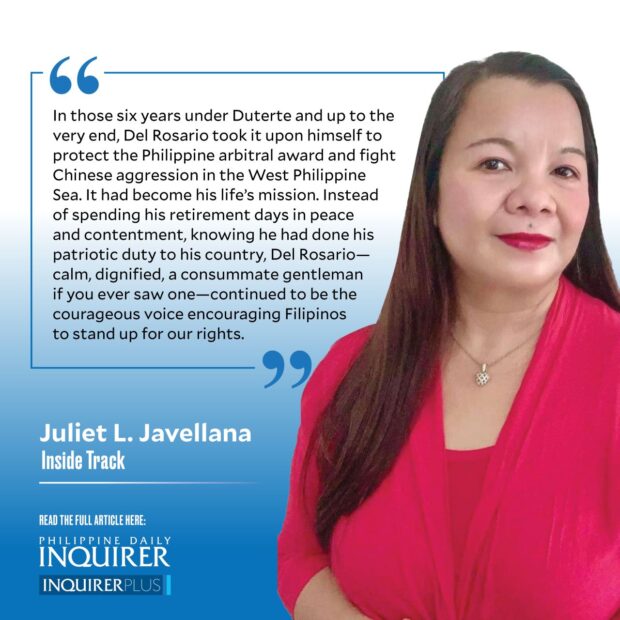Albert del Rosario: Courage of a ‘marked’ man

Weeks later, over lunch in his office in Makati City, we had a good laugh over the incident. “You were asking for it,” I ribbed him about daring to step in Hong Kong despite his being possibly China’s Enemy No. 1 in the Philippines, and he laughed in agreement. After all, Del Rosario, who was foreign affairs secretary to President Benigno Aquino III from 2011 to 2016, led the filing of the Philippines’ winning case against China before the arbitral tribunal in 2013. The tribunal’s 2016 landmark ruling upheld the country’s territorial rights in the West Philippine Sea and invalidated China’s nine-dash line which claims nearly the entire South China Sea. That ruling is now being invoked by many countries pushing for the rule of law and peace in the region.
The Hong Kong incident was preceded by another risky move by Del Rosario who, with retired Supreme Court Senior Associate Justice Antonio Carpio and retired Ombudsman Conchita Carpio-Morales, formed a formidable trio in standing up to China’s bullying in the West Philippine Sea.
Article continues after this advertisementEarlier in March 2019, Del Rosario came to see me in our office in Makati City with a thick folder of documents. At that time, we were in the middle of a company program held in time for the birthday of our president, Sandy Prieto-Romualdez, who was to announce the promotion of several Philippine Daily Inquirer (PDI) executives.
In the background, I could hear my name being called as the new PDI associate publisher, but I could not walk away from the big story that Del Rosario was laying before me. It was my big personal moment so I apologized to him for being distracted. We went on to discuss the big news he was sharing with me in advance—that he and Carpio-Morales were filing a complaint against Chinese President Xi Jinping for crimes against humanity before the International Criminal Court (ICC). The complaint said that China’s aggressive occupation of islands and building of military installations across the South China Sea brought “massive, near permanent, and devastating environmental damage across nations” in the contested body of water.
It was later dismissed for lack of ICC jurisdiction over China (which is not a member), but it was enough to make Del Rosario a marked man.
Article continues after this advertisementAnd not only by China. In his own country that he was staunchly defending, Del Rosario was also regarded as nemesis by then President Rodrigo Duterte who, upon his assumption of office in 2016, set aside the arbitral ruling as part of his appeasement policy toward China.
In a midnight rant sometime in July 2021, Duterte threatened Del Rosario for saying that high-ranking Chinese officials had been bragging about being able to influence the 2016 elections to make Duterte win. Duterte accused Del Rosario of treason and threatened to go to the latter’s house “to pour coffee on [his] face.” After yet another Duterte attack on him, Del Rosario texted me to say: “Will send you [a statement] if you promise to attend my funeral, Juliet.”
In those six years under Duterte and up to the very end, Del Rosario took it upon himself to protect the Philippine Arbitral Award and fight Chinese aggression in the West Philippine Sea. It had become his life’s mission. Instead of spending his retirement days in peace and contentment, knowing he had done his patriotic duty to his country, Del Rosario—calm, dignified, a consummate gentleman if you ever saw one—continued to be the courageous voice encouraging Filipinos to stand up for our rights.
Over these years, I would regularly get his text messages and statements about China’s latest behavior and on other important national issues, and many times we sought his comments about these matters. The last text message came on April 3, saying he would send me a statement the next morning. In it he called for joint maritime patrols in the West Philippine Sea to enforce the 2016 arbitral award. It turned out to be his final statement before his death on April 18.In the few times we could not publish his statement in full or immediately, Del Rosario would send me a tongue-in-cheek text: “I thought I was already being rejected by you. Keep well, my friend. With warm esteem. A.” For those of us fortunate to get to know him up close, Del Rosario was such a warm and funny guy.
As a journalist and a Filipino, you honored me, ADR, by trusting me and the Inquirer to help spread your message of courage and love of country. You are held in the highest esteem. Rest in peace, Sir.
—————–
Juliet Labog-Javellana is associate publisher of the Philippine Daily Inquirer. Email: jjavellana@inquirer.com.ph
















